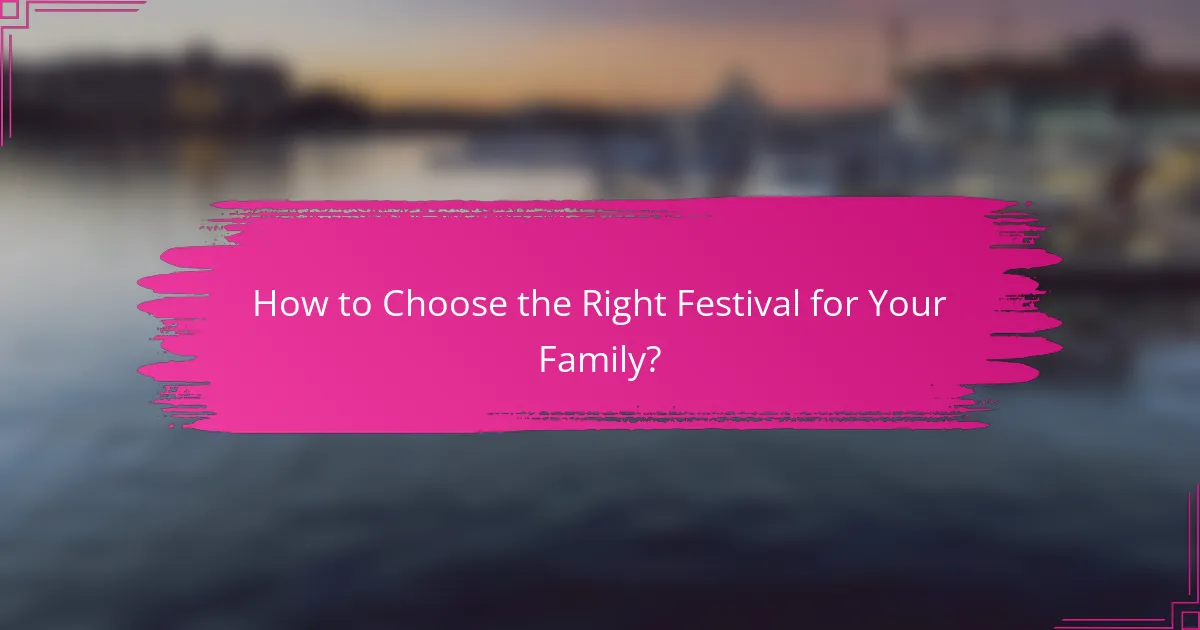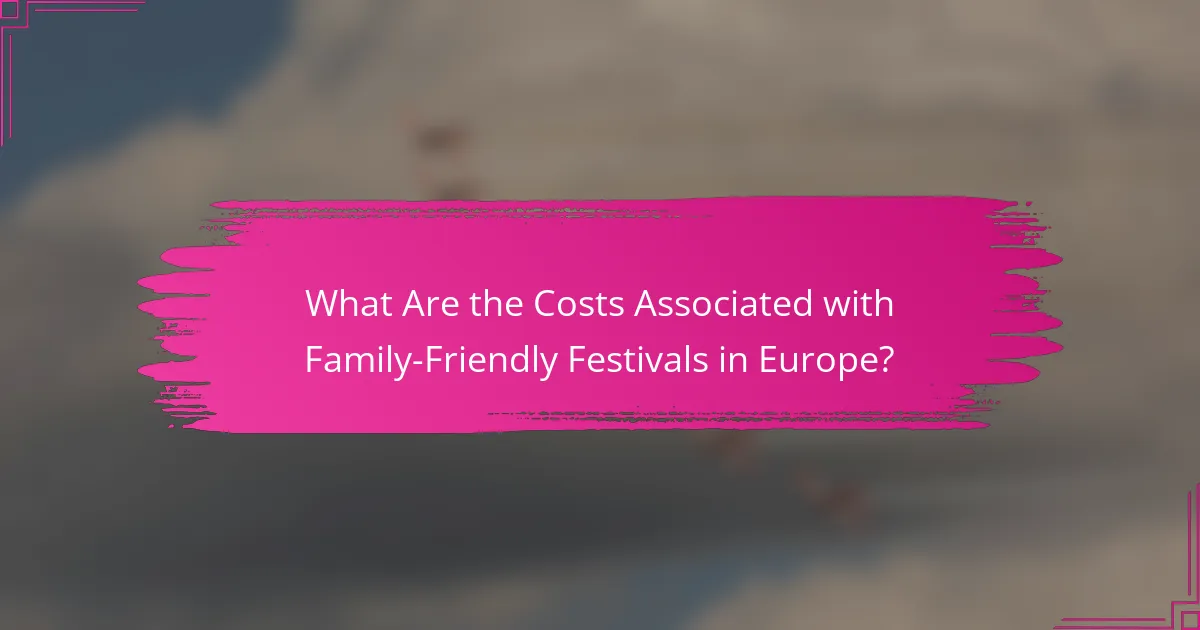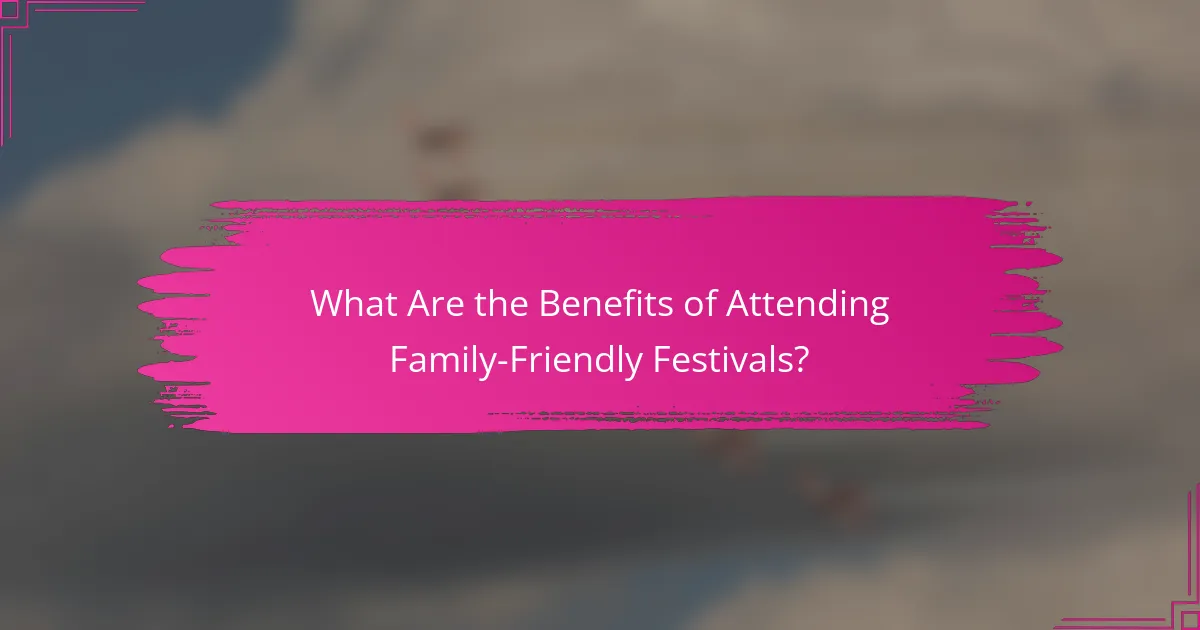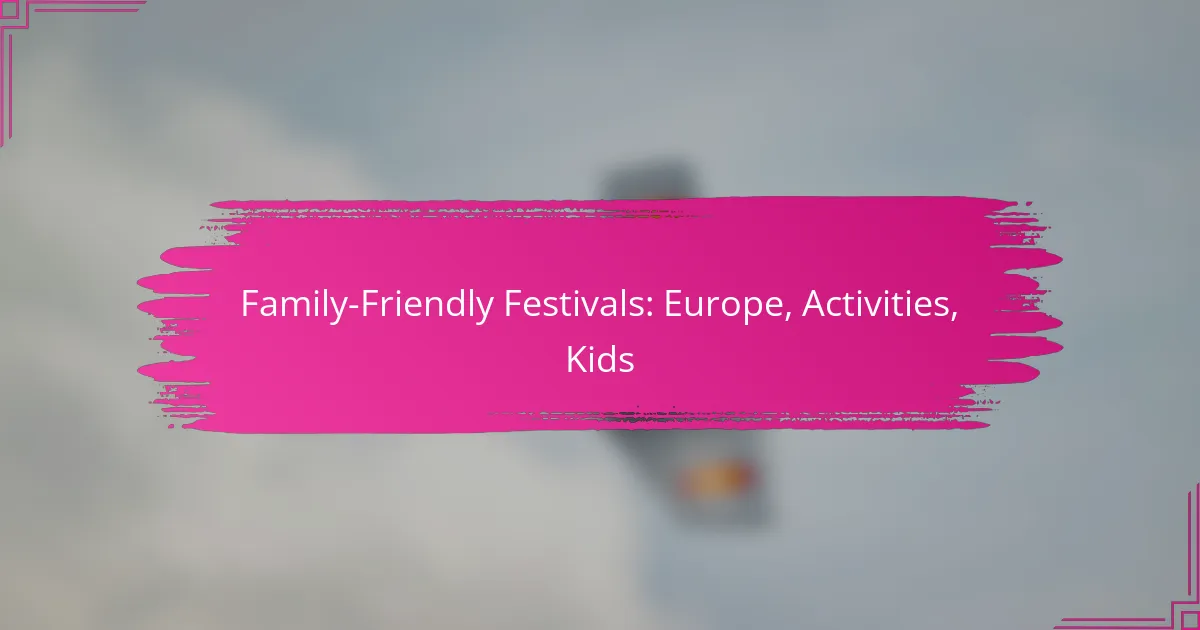Europe is home to a diverse array of family-friendly festivals that provide a wealth of activities for both children and parents. These events feature engaging performances, hands-on workshops, and interactive experiences, ensuring a fun-filled atmosphere for all ages. When selecting a festival, it’s important to consider factors such as age appropriateness and safety measures to guarantee an enjoyable outing for the entire family.

Which Family-Friendly Festivals Are Popular in Europe?
Europe hosts a variety of family-friendly festivals that cater to children and parents alike, offering engaging activities and entertainment. These festivals often feature performances, workshops, and interactive experiences that make them enjoyable for all ages.
Edinburgh Festival Fringe
The Edinburgh Festival Fringe is the world’s largest arts festival, taking place every August in Scotland’s capital. It features thousands of performances across various genres, including theater, comedy, and music, making it a vibrant cultural experience for families.
Families can find numerous shows specifically designed for children, along with street performers and activities throughout the city. Planning ahead is crucial, as popular shows can sell out quickly, so consider booking tickets in advance.
La Patum de Berga
La Patum de Berga is a unique festival held in Berga, Spain, typically in June, celebrating the arrival of summer. This UNESCO-recognized event features colorful parades, fireworks, and giant figures, creating a lively atmosphere that captivates children and adults alike.
Families can enjoy the vibrant street performances and participate in various activities, including workshops and games. It’s advisable to check local schedules, as the festival dates can vary each year.
Glastonbury Festival
Glastonbury Festival, held in Somerset, England, is one of the most famous music festivals in the world, taking place every June. While primarily known for its music, it also offers a dedicated area for families, featuring kid-friendly activities, workshops, and performances.
Parents should consider bringing camping gear, as the festival spans several days. Arriving early can help secure a good camping spot, and families should prepare for unpredictable weather by packing appropriate clothing and supplies.
Fête de la Musique
The Fête de la Musique, celebrated on June 21st in France and many other countries, is a festival dedicated to music in all its forms. This event encourages amateur and professional musicians to perform in public spaces, creating a lively atmosphere suitable for families.
Families can explore various musical styles, from classical to pop, and enjoy free performances throughout the day. It’s a great opportunity for children to experience live music and engage with artists in an informal setting.
Oktoberfest
Oktoberfest, held annually in Munich, Germany, is the world’s largest beer festival, running from late September to the first weekend in October. While it is primarily known for its beer tents, Oktoberfest also offers a range of family-friendly activities, including amusement rides, games, and traditional music.
Families can enjoy the festive atmosphere and sample traditional German foods. It’s advisable to visit during the day when the festival is less crowded and more suitable for children, ensuring a more enjoyable experience for all.

What Activities Are Available for Kids at European Festivals?
European festivals offer a variety of engaging activities for kids, ensuring a fun and memorable experience. From hands-on workshops to thrilling live performances, children can explore their creativity and enjoy interactive entertainment.
Interactive Workshops
Interactive workshops at festivals provide kids with opportunities to learn new skills in a fun environment. These sessions often include activities like cooking, music, dance, or crafting, allowing children to express themselves creatively. Parents should check the age recommendations and duration of each workshop to ensure a good fit for their children.
Many festivals feature local artisans or professionals leading these workshops, which can enhance the learning experience. For example, a festival in Italy might offer pasta-making classes for kids, while a festival in France could include painting sessions with local artists.
Live Performances
Live performances are a highlight at many European festivals, featuring everything from puppet shows to theatrical productions. These performances are designed to captivate young audiences, often incorporating humor and interactive elements. Families should look for schedules in advance to plan which shows to attend.
Festivals may host performances that showcase local culture, such as traditional dance or music, providing children with a unique cultural experience. For instance, a festival in Spain might include flamenco dancing, while a festival in Germany could feature folk music and storytelling.
Arts and Crafts Stations
Arts and crafts stations are popular at festivals, allowing kids to create their own masterpieces. These stations typically offer a range of materials and guided activities, such as painting, drawing, or building with recycled materials. Parents should encourage their children to explore different mediums and express their creativity freely.
Some festivals may even have themed crafts that reflect local culture or the festival’s overall theme. For example, a festival in Greece might provide materials for making traditional masks, while a festival in the UK could feature DIY flower crowns.
Outdoor Games
Outdoor games are a staple of family-friendly festivals, providing kids with a chance to burn off energy and socialize. Activities may include sack races, tug-of-war, or obstacle courses, often designed to be inclusive for various age groups. Parents should supervise younger children to ensure safety during these activities.
Many festivals also incorporate traditional games from the region, which can be a fun way for kids to learn about local customs. For instance, a festival in Scotland might feature caber tossing for older kids, while younger children can enjoy simpler games like ring toss or giant Jenga.

How to Choose the Right Festival for Your Family?
Choosing the right festival for your family involves considering factors like age appropriateness, festival size, accessibility, and safety measures. These elements ensure that the event will be enjoyable and suitable for all family members.
Consider Age Appropriateness
When selecting a festival, it’s crucial to assess whether the activities and entertainment are suitable for your children’s ages. Look for festivals that offer age-specific zones or activities, such as play areas for toddlers or workshops for older kids.
Many family-friendly festivals provide detailed schedules that indicate which events are designed for different age groups. This can help you plan your visit and ensure that everyone has engaging experiences.
Evaluate Festival Size
The size of a festival can significantly impact your family’s experience. Larger festivals may offer more activities but can also be overwhelming and crowded, making it challenging to keep track of children.
Consider attending smaller, community-based festivals that often provide a more intimate atmosphere. These events typically have fewer attendees, making it easier for families to navigate and enjoy without feeling rushed.
Check Accessibility Options
Accessibility is an essential factor when choosing a festival, especially for families with strollers or children with mobility challenges. Look for festivals that provide accessible pathways, seating, and rest areas.
Many festivals now include information on their websites regarding accessibility features. This can include wheelchair rentals, designated parking, and sensory-friendly spaces, ensuring a comfortable experience for all attendees.
Review Safety Measures
Safety should be a top priority when attending any festival with children. Check if the festival has measures in place, such as security personnel, first aid stations, and child identification wristbands.
It’s wise to familiarize your children with safety protocols, such as where to go if they get lost. Festivals that provide clear signage and staff assistance can enhance your family’s sense of security during the event.

What Are the Costs Associated with Family-Friendly Festivals in Europe?
Family-friendly festivals in Europe can vary widely in costs, influenced by factors such as location, duration, and the specific activities offered. Understanding the main expense categories—ticket prices, accommodation, food and beverage, and transportation—can help families budget effectively for an enjoyable experience.
Ticket Prices
Ticket prices for family-friendly festivals typically range from €10 to €100 per person, depending on the festival’s scale and popularity. Many festivals offer discounted rates for children or family packages that can reduce overall costs.
It’s advisable to purchase tickets in advance, as early bird rates can provide significant savings. Additionally, some festivals may offer free entry for younger children, making it more affordable for families with multiple kids.
Accommodation Costs
Accommodation costs during festivals can vary greatly based on location and type of lodging. Families can expect to pay anywhere from €50 to €200 per night for hotels or vacation rentals near festival venues.
Camping is often a budget-friendly option at many festivals, with fees ranging from €10 to €30 per night per tent. Booking accommodations early can help secure better rates and availability, especially in popular tourist areas.
Food and Beverage Expenses
Food and beverage expenses at festivals can add up quickly, with prices for meals typically ranging from €5 to €15 per person. Many festivals feature a variety of food stalls, offering everything from local cuisine to international dishes.
Families can save money by bringing snacks or picnics, as some festivals allow outside food. Additionally, look for family meal deals or discounts on children’s meals to keep costs manageable.
Transportation Fees
Transportation fees to and from festivals can vary based on distance and mode of travel. Families should budget for train or bus fares, which can range from €10 to €50 per person, depending on the location and booking time.
If driving, consider fuel costs and parking fees, which can be around €5 to €20 per day. Using public transportation can often be more economical, especially for larger families, and many festivals are accessible via local transit options.

What Are the Benefits of Attending Family-Friendly Festivals?
Family-friendly festivals offer numerous benefits, including quality time together and opportunities for cultural exposure. These events create memorable experiences that can strengthen family bonds while introducing children to diverse traditions and activities.
Quality Family Time
Attending family-friendly festivals allows families to spend quality time together in a fun and engaging environment. Activities such as games, crafts, and performances encourage interaction and collaboration among family members.
Consider planning your visit around specific events or workshops that cater to children’s interests. This can enhance engagement and ensure everyone has a good time. Look for festivals that offer a variety of activities suitable for different age groups to maximize enjoyment.
Cultural Exposure
Family-friendly festivals often showcase various cultural traditions, providing a unique opportunity for children to learn about different customs and practices. Engaging with diverse cultures can foster appreciation and understanding, which is vital in today’s interconnected world.
When attending these festivals, encourage your children to participate in cultural activities, such as dance workshops or cooking demonstrations. This hands-on experience can make learning enjoyable and memorable, helping to instill a sense of curiosity about the world around them.
